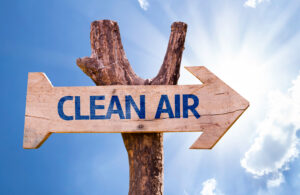- Most health professionals’ training curricula do not sufficiently address the health impacts of air pollution.
- Only 11% of medical schools worldwide include air pollution as a risk factor for health as part of formal education, according to a report from International Association of Medical Students’ Associations.
- The first WHO online course on air pollution and health for health workers will be launched at the margins of this year’s International Day of Clean Air for blue skies.
- Health workers have an important role to play in the battle for clean air.
A groundbreaking health workers training
In a landmark collaboration with over 30 international experts, the World Health Organization (WHO) has developed the first health workers’ training on air pollution and its health impacts, specifically tailored for health professionals, to be unveiled at the end of 2023. The Air Pollution and Health Training toolkit (APHT) includes downloadable training modules accompanied by a manual using a train-the-trainers approach to inform and empower health care professionals. In anticipation of the toolkit’s launch, a readily accessible will be released on September 5, 2023, at the margins of this year’s International Day for Clean Air for blue skies.
“Health workers are on the front lines of patient care,” according to Dr Maria Neira, Director of the Department of Environment, Climate Change and Health at WHO. She emphasized the importance of the newly launched course: “The ability of health professionals to recognize, prevent, and manage air pollution-related health issues is crucial to protect people’s well-being and our communities’ health systems. This training toolkit provides them with evidence-based insights, practical guidance, and resources to communicate risks to individuals, and to advocate for clean air and healthier populations.“
Air pollution and the role of health workers
Air pollution has emerged as a significant global health challenge, with far-reaching consequences on both individual well-being and public health. WHO estimates that, globally, air pollution is responsible for about 7 million premature deaths per year from ischemic heart disease, stroke, chronic obstructive pulmonary disease and lung cancer, and acute respiratory infections such as pneumonia, mainly affecting children in low- and middle-income countries.
Air pollution also threatens the global economy as it imposes enormous global health costs, representing 6.1% of the global gross domestic product (more than US$ 8 trillion in 2019).
The international community has recognized that health workers have a prominent role to play in the battle for clean air. However, most health curricula do not sufficiently address the health impacts of air pollution. By enhancing the capacity of health professionals to tackle this issue, WHO envisions a healthier and cleaner future for communities worldwide, with particular attention to the most vulnerable populations.
Air Pollution and Health Training toolkit (APHT)
The Air Pollution and Health training toolkit is designed for health workers, in both the clinical and public health fields, to understand the health risks of air pollution and identify risk reduction measures. As well. It equips health workers to use the health argument to advocate for clean air interventions and promote the collaboration between relevant civil society actors and governmental institutions for policy implementation. Using a train-the-trainer approach, the APHT toolkit also helps facilitate the organization of in-person workshops, online courses and other learning opportunities.
Health systems pay the price of illnesses that result from air pollution exposure; therefore, the health sector has a vested interest in improving air quality. Tools provided by WHO, such as this health workers training program, can empower local health workers in their communities to advocate for policy changes while advising patients and individuals on reducing their exposure.
The first part of the toolkit is an OpenWHO online course, which aims to provide health workers with knowledge to understand the risks of air pollution and to communicate to individuals and communities how to reduce their exposure. This course is made up of 4 modules: outdoor (ambient) air pollution, household air pollution, the main health effects of air pollution exposure and what health workers can do.
The key audience of the online course, which is freely accessible, is health workers around the globe. This includes medical doctors, nurses, midwives, community health workers, medical students and future health care professionals, public health professionals, officers at the ministries of health and health policymakers at the national and sub-national levels.
2023 International Day of Clean Air for blue skies
The launch of this groundbreaking health workers’ training aligns with the International Day of Clean Air for Blue Skies, an occasion dedicated to raising awareness about the importance of clean air for a sustainable future. resonates with WHO’s mission to safeguard human health and the environment while promoting multisectoral action.
The OpenWHO course will be launched on 5 September 2023 during a webinar session featuring experts around air quality, health and health education. Besides launching the course, the event will showcase key initiatives to raise awareness and equip health professionals to tackle air pollution and protect public health. It will also preview the other products of the upcoming Air Pollution and Health Training toolkit targeting health workers.
This event is part of the WHO Webinar Series – Clean air and energy for health: from evidence to solutions. The series gives a 360° view of the current state of science, tools, interventions and the implementation of policies and programmes for clean air and better health. This series will also showcase solutions that can help prevent or mitigate air pollution health, economic and environmental costs.
Bringing together experts, leaders, policymakers, civil society champions, and innovators from a multi-sectorial perspective, this health workers training fosters dialogue, shares knowledge, and ultimately shapes a healthier, more sustainable future for all.
***
Further resources
Air pollution and health training toolkit for health workers (APHT)
Webinar Series: Clean air and energy for health – from evidence to solutions
Mapping opportunities for training in air pollution and health for the health workforce
